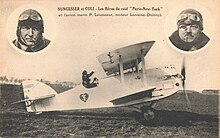François Coli
This article includes a list of general references, but it remains largely unverified because it lacks sufficient corresponding inline citations. (July 2011) |
François Coli | |
|---|---|
 François Coli | |
| Born | 5 June 1881 |
| Disappeared | 8 May 1927 (aged 45) |
| Nationality | French |
| Known for | Flights across Mediterranean, and attempt at Transatlantic flight |
François Coli (5 June 1881 – presumably on or after 8 May 1927) was a French pilot and navigator best known as the one-eyed flying partner of Charles Nungesser in their doomed, fatal attempt to achieve the first transatlantic flight.
Early life and World War I[]
Born in Marseilles of a Corsican seafaring family, Coli became a merchant captain, married, and produced three daughters. Upon outbreak of World War I he offered his services to the French Navy. Reportedly disillusioned because no warships needed a captain, he entered the army as a private. His age and experience gained him a commission in 1915 and that summer he was promoted to captain. Suffering multiple wounds, he was declared unfit for infantry service and transferred to the French Air Service, gaining his pilot's brevet in March 1916. Late that year he joined Escadrille N.62 and rose to command the squadron in February 1917.
Captain Coli remained as chief of the Escadrille des Coqs even after losing an eye in a crash in March 1918. He departed the Roosters that August with a reputation as an exceptional navigator and leader.
Post-war career[]

After the war Coli began a series of record-setting distance flights. On 26 January 1919 he achieved the first double crossing of the Mediterranean with Lieutenant Henri Roget. The flight established the over-water distance record of 735 kilometers (457 statute miles) in five hours.
On 24 May, again with Roget, Coli set a long-distance record from Paris to Port Lyautey, Morocco, a distance of 2,200 kilometers (1,400 mi). He was injured in the crash at the end of the flight.
The following year, 1920, with Joseph Sadi-Lecointe, Coli made further long-distance flights around the Mediterranean.
In 1923 Coli began planning a nonstop transatlantic flight with wartime comrade Paul Tarascon, a leading flying ace. In 1925 they became interested in the Orteig prize of $25,000 for the first flight between Paris and New York. Late in 1926 an accident destroyed their Potez 25 biplane and Tarascon was badly burned. A new aircraft was sought, and Tarascon relinquished his place as pilot to Charles Nungesser. They took off from Paris on 8 May 1927 in the biplane L'Oiseau Blanc, but disappeared en route.
In 1928, the Ontario Surveyor General named a number of lakes in the northwest of the province to honour aviators who had perished during 1927, mainly in attempting oceanic flights.[1][2] Amongst these are Coli Lake (51°19′N 93°35′W / 51.32°N 93.59°W) and Nungesser Lake (51°29′N 93°31′W / 51.49°N 93.52°W).
For details of other memorials, see L'Oiseau Blanc Legacy.
See also[]
References[]
- ^ Ontario Ministry of Natural Resources (2007). "St. Raphael Signature Site Strategy" (PDF). Toronto, ON. Archived from the original (PDF) on 2012-09-27. Retrieved 2011-07-19. p 14.
- ^ "Lost Aviators: New Lakes Named". The West Australian. Perth, WA. 16 January 1928. p. 13. Retrieved 2011-07-19.
External links[]
| Wikimedia Commons has media related to François Coli. |
- Escadrille 62
- Tighar Tracks (Spring 1987), Volume 3, Number 1, published by The International Group for Historic Aircraft Recovery
- "Mystery of the White Bird"
- cenotaph;findagrave memorial
- 1881 births
- 1920s missing person cases
- 1927 deaths
- Aviators killed in aviation accidents or incidents
- Flight navigators
- French aviation record holders
- French people with disabilities
- French World War I pilots
- Missing aviators
- People from Marseille
- People lost at sea
- Victims of aviation accidents or incidents in 1927
- Victims of aviation accidents or incidents in international waters
 WikiMiniAtlas
WikiMiniAtlas